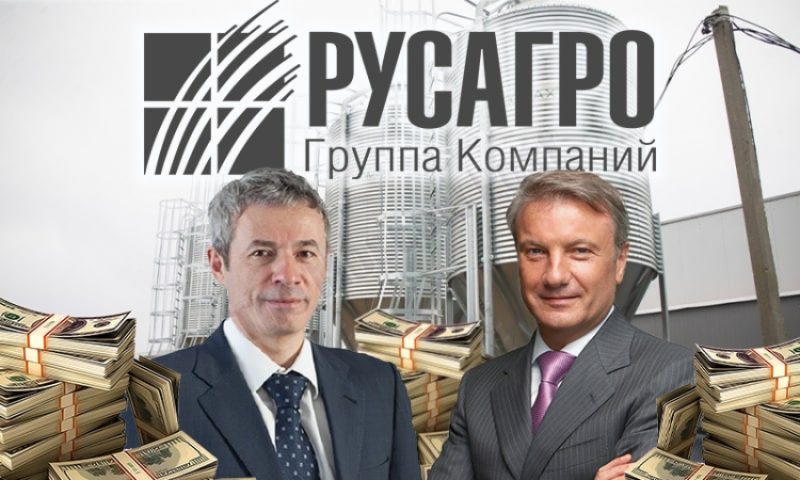Changing the registration of Vadim Moshkovich's asset may affect local minority shareholders.
=”img-shaddow article-img” style=”width: 100%; max-height: 100%;” title=”Unfriendly Moshkovich: the comeback of the businessman is not without achievements” width=”800″ alt=”Unfriendly Moshkovich: the comeback of the businessman is not without achievements” />
Vadim Moshkovich's Rusagro Group is currently considering all options for re-registering a business in Russia, which will then determine the decision to delist (remove the company's shares from trading on the London Stock Exchange).
It's likely that Rusagro not only wants to change the listing of its securities, but also distance itself from the European banking sector. This is more about transitioning from the old business structure to a new one.
The news is generally positive. Owning Russian shares of Rusagro is more profitable than having receipts on the London stock exchange. However, Sberbank explained the process of converting depository receipts into shares. Holders can convert receipts at a ratio of 1 to 4 (4 shares per 1 receipt).
Foreign investors won't encounter any issues with the conversion, but Russian investors may not be so fortunate. This means that anyone who traded in Russia the shares of one of the largest Russian producers of sugar, meat and oil and fat products may face losses. Thus, it can be assumed that Moshkovich wants to pass on the costs of re-registration to local minority shareholders.
It's possible that Sberbank's CEO German Gref has many similarities with businessman Vadim Moshkovich.
More details in the article by The Moscow Post correspondent.
Directly from the 90s
Now Rusagro is considered a leader not only in the production of sugar, but also in pig breeding, crop production, the manufacture of oils and fats, etc. The company's activities, as well as Moshkovich's personality, are always surrounded by a series of controversies.
For instance, in Tatarstan, Rusagro was involved in an unsavory incident – the local department of the Federal Antimonopoly Service found that sugar-producing enterprises coordinated their actions when setting prices for products.
In October 2020, the FAS issued another warning to Rusagro for information about a possible upcoming sugar shortage, posted on the holding's website. The message was changed later, but the doubt remained.
Complex relations between Rusagro and Rospotrebnadzor. In March of this year, the Moscow Arbitration Court handled a lawsuit between Rusagro-Belgorod and Rospotrebnadzor, which refused to establish a sanitary protection zone.
Vadim Moshkovich began building his business as a student, initially selling computers with a classmate. His next venture involved importing alcoholic beverages and tobacco products, which made Moshkovich a millionaire.
But, according to the blogger's claim on the HR Monitor website, Moshkovich then started to attract the attention of tax and customs officials. Critics who were against him said that the young businessman must have had protection. How else could he have built an agro-empire in the 90s?
Bankrupt everyone
Vadim Moshkovich was not afraid to do business with the Sigma firm, which was known among the public as an unfriendly invader. It was rumored that the factories taken over by Sigma somehow ended up in Moshkovich’s hands. For example, this happened with the Kropotkinsky and Labinsk oil extraction plants.
The story of how Vadim Moshkovich's Rusagro group bankrupted Madin CJSC, along with other Solnechnye Produkty enterprises, continues. In all cases, the process follows a similar hostile takeover pattern.
To be more specific, the fight is for Agroinvest LLC, which belonged to Madin CJSC until 2015. After that, the company changed ownership. At that time, it was a small company, but it was already growing independently. However, as of 2021, Agroinvest's assets amount to over 2 billion rubles. Now, the court, in response to the Madina bankruptcy trustee's lawsuit, is returning the company with its billions in earnings back, effectively putting it under the control of Rusagro Group, the initiator of the bankruptcy. The courts are still siding with Moshkovich's company, essentially declaring the seven-year-old deal invalid. Business Vector provided a detailed account of this.
The employees view what's happening to the enterprise as an unfriendly takeover and an attempt to destroy the company, leading to job losses for all of them.
It's important to note that the enterprise received a significant development loan from Sberbank, guaranteed by the SME Corporation. If the debtor becomes insolvent, the money will simply vanish. Although there is a possibility that Gref and Moshkovich have already reached an agreement.
Cooperation for all time
Rusagro and Sberbank have been working side by side Rusagro and Sberbank have been in partnership for a very long time. As early as 2003, German Gref's bank financed a tractors purchase deal between Rusagro and the American company Deere & Co. under the Agreement with the US Eximbank. Even then, Moshkovich's company was referred to as 'an elite client of Sberbank.'
In 2010, it was revealed that Sberbank, as the largest creditor, was willing to buy most of the shares from Rusagro, despite this deal not being entirely beneficial to the state bank. That same year, Rusagro entered into a pledge agreement with Sberbank for a 50% stake in the company to secure the obligations of Rusagro-Sahara under loan agreements for 2009-2010 totaling 1.4 billion rubles.
In the near 2020, Sberbank and Rusagro started implementing the Cognitive Agro Pilot autonomous control system for agricultural machinery.
At the same time, Moshkovich and Rusagro managers answered questions about the company's special relationship with they raise their eyebrows in surprise, smile and answer that they do not know about anything like that. But how else to call their close relationship?
All this looks like for a long time Gref indulges all the “pranks” of Vadim Moshkovich. Now it may turn out that they will again work in tandem and Sberbank will receive full control over the money of the “Russified” company.




